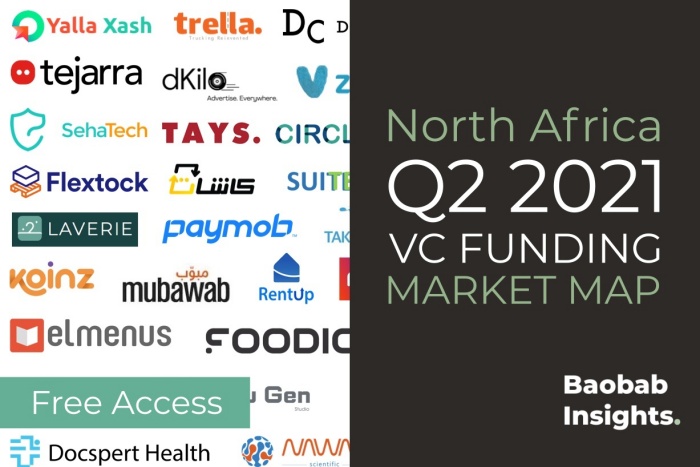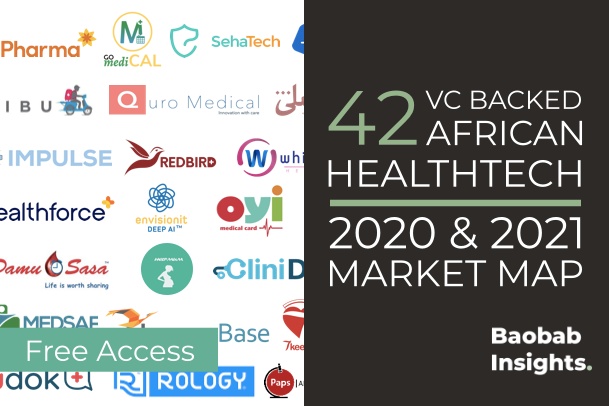PocketDoc: On the ground experience in Morocco with Dr Imad Chakri
In our “on the ground” series, we connect with our community of founders across Africa and ask them to share their experience of building a business. In this post we head to Morocco and meet the team at PocketDoc.Dr. Imad Chakri is graduate from the Faculty of Medicine and Pharmacy of Oujda, a resident in Health informatics, and CEO and founder of PocketDoc. Imad was inspired by his own personal experience as a newly qualified doctor and turned that into an application to help support improved medical decision making. PocketDoc joined The Baobab Network accelerator in 2019
Why PocketDoc?
Africa has had an ongoing and historic shortage of Doctors. In 2013, sub-Saharan Africa had a deficit of an estimated 1.8 million health workers, according to a WHO report—this deficit is projected to rise to 4.3 million by 2035. In 2021, there is still a severe deviation between what is recommended and what resource is available on the ground
This is a result of several factors; the biggest of which is education and the availability of institutions to train doctors. As the continent tries to catch up with need, there is a greater focus is placed on training doctors, with less support available to doctors once they are practicing. The current coronavirus (COVID-19) pandemic highlights this gap even more.
For newly qualified doctors, less support can lead to increased risk of misdiagnoses.
Doctors frequently need to seek peer support to confirm diagnoses, medications and treatments. For many medical professionals, similar to Imad, the internet is the primary source of information. For francophone markets; access to relevant, accurate French language articles are hard to find, and internet in some rural areas, internet connectivity can be unreliable.
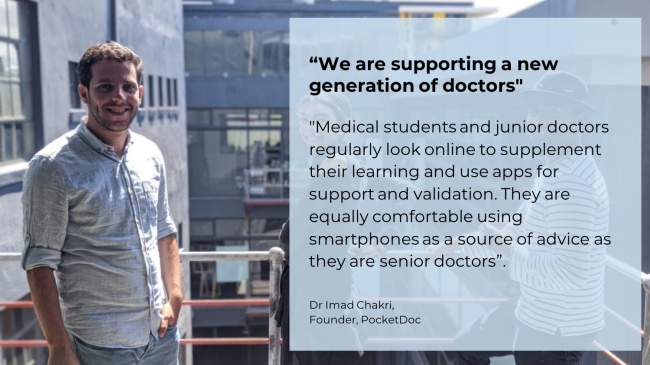
Image and Source: Dr Imad Chakri (Founder and CEO, PocketDoc), The Baobab Network
The Solution
PocketDoc is a smartphone-based platform that provides healthcare professionals in Africa access to integrated medical information, communication channels and education tools. Thereby helping to reduce human error and improving patient outcomes.
Imad tells us at the beginning, PocketDoc started by providing health professionals quick reference material and medical information in 23 different medical specialties.
The idea was that their content would support doctors in their practice by helping them make the right diagnosis and write the right medical prescription. In addition, the app also enables medical students to prepare for their clinical exams.
Dr Imad explains, “we aim to make PocketDoc the platform where all healthcare professionals can share knowledge, communicate and be informed of the latest medical news.”
A Problem Shared…
Dr Imad told us when he started PocketDoc, it was to solve his own problem. “I was in my last year of medical school at the time, I was working at the emergency service and in health centres.”
From a case and workload perspective, he was working as a senior doctor despite the fact he was still learning.
He goes on to explain “I found myself many times struggling in front of patients and there is no support. In many cases I was just Googling for more information. This was really time consuming, sometimes irrelevant and didn’t help.”
Through research with doctors, Imad and his team found that the issue wasn’t just affecting him, it was something doctors across the continent were facing.
Customer research conducted in 2019 highlighted areas of concern for newly qualified doctors. A lack of access to information, few direct communication channels with peers or support networks, or centralised hub for information were common themes, and the catalyst for PocketDoc.
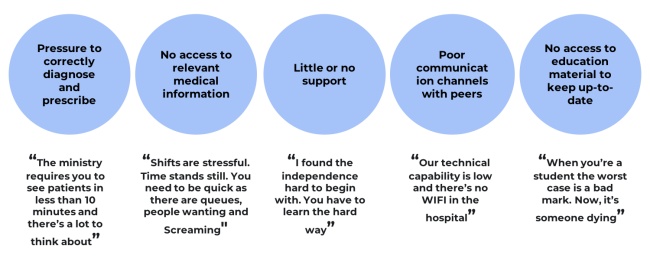


Source: PocketDoc
As a self-taught software engineer, PocketDoc isn’t the first application that Imad has launched, “The first time I combined medicine and programming was in 2016 when I developed a platform for medical students to study and discuss clinical cases with the presence of a Professor in real time. This platform won the title of the best web app for the year in Morocco.”
He adds, “I am proud about the impact that PocketDoc creates directly on health professionals and indirectly on the patients’ lives.”
What COVID-19 taught the PocketDoc Team?
The COVID-19 pandemic has highlighted how strained our healthcare systems actually are, and further validates the need to support healthcare professionals.
Reflecting on the response to COVID-19 in Morocco, Imad says “communication has an important role to play in fighting this pandemic. Having tools such as PocketDoc can make the horizontal (Doctor to Doctor) and vertical (Ministry of Health to Doctor) communication extremely quick. Keeping doctors up to date with the latest news about the virus and recommended treatments is vital.”
For the business itself, lockdown and other precautionary measures delayed some administrative tasks related to the business operations. The team used this time to proactively think of ways to improve user experience and further embed their support for healthcare providers.
What does the future hold for PocketDoc?
While PocketDoc has an important role to play in improving healthcare communication between medical professionals, Imad see’s their future in helping to improve the accuracy of diagnosis, through the integration of technologies such as of AI across various medical specialities.
In addition to this, he explains that supporting the successful triage of patients based on urgency, is on the next big challenges PocketDoc will be looking into over the next 5 years.
The team plan to expand their customer base across Anglophone Africa as well as improving the interactive nature of the app as he builds towards his goal to build a one stop shop for doctors and healthcare professionals across Africa.
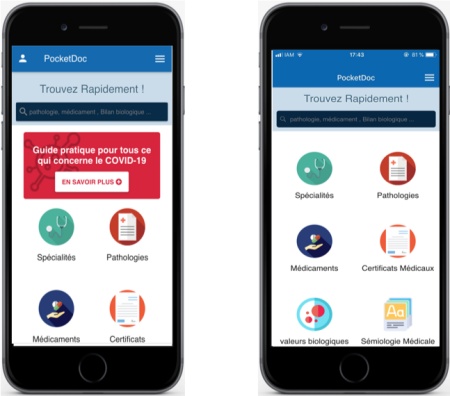

Try and try again
When asked for final thoughts and advice to new founders Imad said “I faced many different problems when I started PocketDoc from administrative papers to technical issues; but I believe that there is always a solution for any problem. We just need to be patient and continue trying until you get the desired result.”
While we continue to see investment in logistics and fintech in Africa as enablers, we believe that health-tech is an important focus and will continue to be until we start to see a significant improvement in the state of healthcare systems on the continent.
PocketDoc: On the ground experience in Morocco with Dr Imad Chakri
In our “on the ground” series, we connect with our community of founders across Africa and ask them to share their experience of building a business. In this post we head to Morocco and meet the team at PocketDoc.Dr. Imad Chakri is graduate from the Faculty of Medicine and Pharmacy of Oujda, a resident in Health informatics, and CEO and founder of PocketDoc. Imad was inspired by his own personal experience as a newly qualified doctor and turned that into an application to help support improved medical decision making. PocketDoc joined The Baobab Network accelerator in 2019
Why PocketDoc?
Africa has had an ongoing and historic shortage of Doctors. In 2013, sub-Saharan Africa had a deficit of an estimated 1.8 million health workers, according to a WHO report—this deficit is projected to rise to 4.3 million by 2035. In 2021, there is still a severe deviation between what is recommended and what resource is available on the ground
This is a result of several factors; the biggest of which is education and the availability of institutions to train doctors. As the continent tries to catch up with need, there is a greater focus is placed on training doctors, with less support available to doctors once they are practicing. The current coronavirus (COVID-19) pandemic highlights this gap even more.
For newly qualified doctors, less support can lead to increased risk of misdiagnoses.
Doctors frequently need to seek peer support to confirm diagnoses, medications and treatments. For many medical professionals, similar to Imad, the internet is the primary source of information. For francophone markets; access to relevant, accurate French language articles are hard to find, and internet in some rural areas, internet connectivity can be unreliable.



Image and Source: Dr Imad Chakri (Founder and CEO, PocketDoc), The Baobab Network
The Solution
PocketDoc is a smartphone-based platform that provides healthcare professionals in Africa access to integrated medical information, communication channels and education tools. Thereby helping to reduce human error and improving patient outcomes.
Imad tells us at the beginning, PocketDoc started by providing health professionals quick reference material and medical information in 23 different medical specialties.
The idea was that their content would support doctors in their practice by helping them make the right diagnosis and write the right medical prescription. In addition, the app also enables medical students to prepare for their clinical exams.
Dr Imad explains, “we aim to make PocketDoc the platform where all healthcare professionals can share knowledge, communicate and be informed of the latest medical news.”
A Problem Shared…
Dr Imad told us when he started PocketDoc, it was to solve his own problem. “I was in my last year of medical school at the time, I was working at the emergency service and in health centres.”
From a case and workload perspective, he was working as a senior doctor despite the fact he was still learning.
He goes on to explain “I found myself many times struggling in front of patients and there is no support. In many cases I was just Googling for more information. This was really time consuming, sometimes irrelevant and didn’t help.”
Through research with doctors, Imad and his team found that the issue wasn’t just affecting him, it was something doctors across the continent were facing.
Customer research conducted in 2019 highlighted areas of concern for newly qualified doctors. A lack of access to information, few direct communication channels with peers or support networks, or centralised hub for information were common themes, and the catalyst for PocketDoc.



Source: PocketDoc
As a self-taught software engineer, PocketDoc isn’t the first application that Imad has launched, “The first time I combined medicine and programming was in 2016 when I developed a platform for medical students to study and discuss clinical cases with the presence of a Professor in real time. This platform won the title of the best web app for the year in Morocco.”
He adds, “I am proud about the impact that PocketDoc creates directly on health professionals and indirectly on the patients’ lives.”
What COVID-19 taught the PocketDoc Team?
The COVID-19 pandemic has highlighted how strained our healthcare systems actually are, and further validates the need to support healthcare professionals.
Reflecting on the response to COVID-19 in Morocco, Imad says “communication has an important role to play in fighting this pandemic. Having tools such as PocketDoc can make the horizontal (Doctor to Doctor) and vertical (Ministry of Health to Doctor) communication extremely quick. Keeping doctors up to date with the latest news about the virus and recommended treatments is vital.”
For the business itself, lockdown and other precautionary measures delayed some administrative tasks related to the business operations. The team used this time to proactively think of ways to improve user experience and further embed their support for healthcare providers.
What does the future hold for PocketDoc?
While PocketDoc has an important role to play in improving healthcare communication between medical professionals, Imad see’s their future in helping to improve the accuracy of diagnosis, through the integration of technologies such as of AI across various medical specialities.
In addition to this, he explains that supporting the successful triage of patients based on urgency, is on the next big challenges PocketDoc will be looking into over the next 5 years.
The team plan to expand their customer base across Anglophone Africa as well as improving the interactive nature of the app as he builds towards his goal to build a one stop shop for doctors and healthcare professionals across Africa.


Try and try again
When asked for final thoughts and advice to new founders Imad said “I faced many different problems when I started PocketDoc from administrative papers to technical issues; but I believe that there is always a solution for any problem. We just need to be patient and continue trying until you get the desired result.”
While we continue to see investment in logistics and fintech in Africa as enablers, we believe that health-tech is an important focus and will continue to be until we start to see a significant improvement in the state of healthcare systems on the continent.



